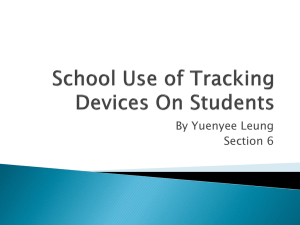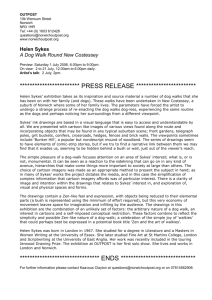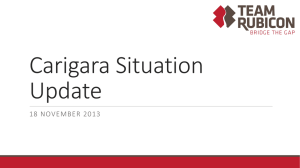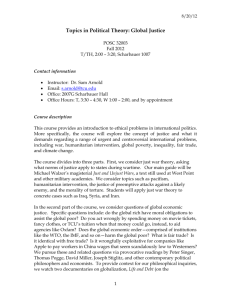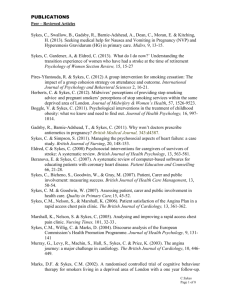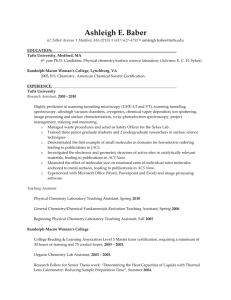Eng 100, Paper #4, annotated citations for ranking and evaluation
advertisement
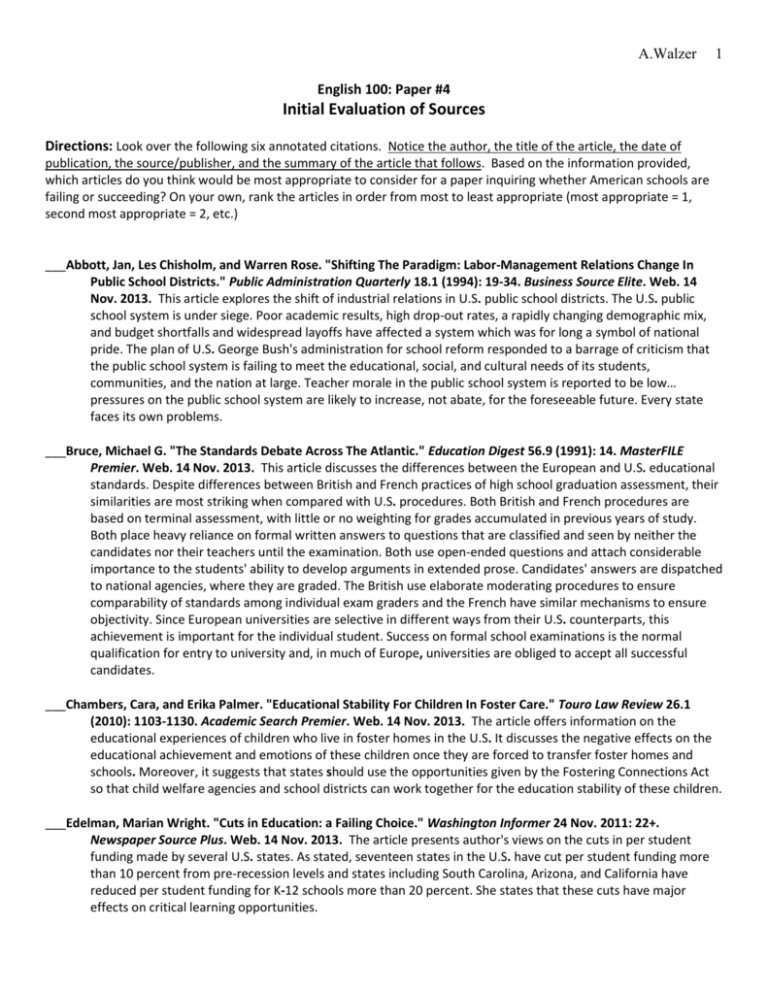
A.Walzer 1 English 100: Paper #4 Initial Evaluation of Sources Directions: Look over the following six annotated citations. Notice the author, the title of the article, the date of publication, the source/publisher, and the summary of the article that follows. Based on the information provided, which articles do you think would be most appropriate to consider for a paper inquiring whether American schools are failing or succeeding? On your own, rank the articles in order from most to least appropriate (most appropriate = 1, second most appropriate = 2, etc.) ___Abbott, Jan, Les Chisholm, and Warren Rose. "Shifting The Paradigm: Labor-Management Relations Change In Public School Districts." Public Administration Quarterly 18.1 (1994): 19-34. Business Source Elite. Web. 14 Nov. 2013. This article explores the shift of industrial relations in U.S. public school districts. The U.S. public school system is under siege. Poor academic results, high drop-out rates, a rapidly changing demographic mix, and budget shortfalls and widespread layoffs have affected a system which was for long a symbol of national pride. The plan of U.S. George Bush's administration for school reform responded to a barrage of criticism that the public school system is failing to meet the educational, social, and cultural needs of its students, communities, and the nation at large. Teacher morale in the public school system is reported to be low… pressures on the public school system are likely to increase, not abate, for the foreseeable future. Every state faces its own problems. ___Bruce, Michael G. "The Standards Debate Across The Atlantic." Education Digest 56.9 (1991): 14. MasterFILE Premier. Web. 14 Nov. 2013. This article discusses the differences between the European and U.S. educational standards. Despite differences between British and French practices of high school graduation assessment, their similarities are most striking when compared with U.S. procedures. Both British and French procedures are based on terminal assessment, with little or no weighting for grades accumulated in previous years of study. Both place heavy reliance on formal written answers to questions that are classified and seen by neither the candidates nor their teachers until the examination. Both use open-ended questions and attach considerable importance to the students' ability to develop arguments in extended prose. Candidates' answers are dispatched to national agencies, where they are graded. The British use elaborate moderating procedures to ensure comparability of standards among individual exam graders and the French have similar mechanisms to ensure objectivity. Since European universities are selective in different ways from their U.S. counterparts, this achievement is important for the individual student. Success on formal school examinations is the normal qualification for entry to university and, in much of Europe, universities are obliged to accept all successful candidates. ___Chambers, Cara, and Erika Palmer. "Educational Stability For Children In Foster Care." Touro Law Review 26.1 (2010): 1103-1130. Academic Search Premier. Web. 14 Nov. 2013. The article offers information on the educational experiences of children who live in foster homes in the U.S. It discusses the negative effects on the educational achievement and emotions of these children once they are forced to transfer foster homes and schools. Moreover, it suggests that states should use the opportunities given by the Fostering Connections Act so that child welfare agencies and school districts can work together for the education stability of these children. ___Edelman, Marian Wright. "Cuts in Education: a Failing Choice." Washington Informer 24 Nov. 2011: 22+. Newspaper Source Plus. Web. 14 Nov. 2013. The article presents author's views on the cuts in per student funding made by several U.S. states. As stated, seventeen states in the U.S. have cut per student funding more than 10 percent from pre-recession levels and states including South Carolina, Arizona, and California have reduced per student funding for K-12 schools more than 20 percent. She states that these cuts have major effects on critical learning opportunities. A.Walzer 2 ___Hanushek, Eric A., et al. "Achievement Growth: International And U.S. State Trends In Student Performance. PEPG Report No.: 12-03." Program On Education Policy And Governance, Harvard University (2012): ERIC. Web. 14 Nov. 2013. The United States' failure to educate its students leaves them unprepared to compete and threatens the country's ability to thrive in a global economy." Such was the dire warning recently issued by a task force sponsored by the Council on Foreign Relations. Chaired by former New York City schools chancellor Joel I. Klein and former U.S. secretary of state Condoleezza Rice, the task force said that the country "will not be able to keep pace--much less lead--globally unless it moves to fix the problems it has allowed to fester for too long. The report's views are well supported by the available evidence. In a 2010 report, only 6 percent of U.S. students were found to be performing at the advanced level in mathematics, a percentage lower than those attained by 30 other countries. Nor is the problem limited to top-performing students… ___Ripley, Amanda. The Smartest Kids in the World and How They Got That Way. Simon & Schuster, 2013. In a handful of nations, virtually all children are learning to make complex arguments and solve problems they’ve never seen before. They are learning to think, in other words, and to thrive in the modern economy. What is it like to be a child in the world’s new education superpowers? In a global quest to find answers for our own children, author and Time magazine journalist Amanda Ripley follows three Americans embedded in these countries for one year. Kim, fifteen, raises $10,000 so she can move from Oklahoma to Finland; Eric, eighteen, exchanges a high-achieving Minnesota suburb for a booming city in South Korea; and Tom, seventeen, leaves a historic Pennsylvania village for Poland. Through these young informants, Ripley meets battle-scarred reformers, sleep-deprived zombie students, and a teacher who earns $4 million a year. Their stories, along with groundbreaking research into learning in other cultures, reveal a pattern of startling transformation: none of these countries had many “smart” kids a few decades ago. Things had changed. Teaching had become more rigorous; parents had focused on things that mattered; and children had bought into the promise of education. A journalistic tour de force, The Smartest Kids in the World is a book about building resilience in a new world—as told by the young Americans who have the most at stake. ___Sykes, Charles J.. Dumbing Down Our Kids: Why American Children Feel Good about Themselves But Can't Read, Write, or Add. St. Martins Press: 1995. Sykes, a journalist who specializes in education issues (A Nation of Victims), weighs into the current school wars with this polemic. A particular target is the school reform movement, epitomized by educators who, as Sykes characterizes them, emphasize students' feelings rather then their learning. In Sykes's view, the usual scapegoats for the decline of American education--parents, society, money--are not the cause of low scores in reading and mathematics; instead, he points the finger at "the schools themselves and the values that dominate American education in the 1990s." He compiles here a sobering catalogue of failed approaches, "self-esteem" programs, political correctness and other trends that militate against the learning of basic skills. He forcefully offers proposals that could work (open up teaching to noneducationists) and others that would initiate a sea change (eliminate tenure). Baltimore's famed private Calvert School is a suggested model. Hint for later: These citations are all done in MLA style. For Paper #4, use this format for your annotated Works Cited list, but 1) limit your annotations t o2-sentence summaries of each text, and 2) double-space the document.



